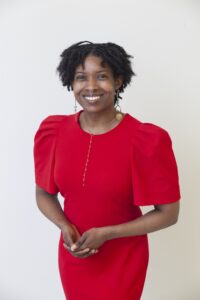At the DC History Center, we aim to provide emerging champions and scholars of DC history access to collections, as well as opportunities to make connections and build community. The Totman Fellowship, which launched in 2022 thanks to a generous donor, supports scholars undertaking new research in the (intentionally broad) fields of Black Washington and LGBTQ+ DC.
 We are thrilled to announce the 2024-2025 Totman Fellow: Bi’Anncha Andrews. Bi’Anncha is researching Black Washington and was selected through a competitive process managed by the DC History Center’s University Advisory Group.
We are thrilled to announce the 2024-2025 Totman Fellow: Bi’Anncha Andrews. Bi’Anncha is researching Black Washington and was selected through a competitive process managed by the DC History Center’s University Advisory Group.
Bi’Anncha’s research will support her exploration of a framework she identifies as “Dispossession by Design.” As she noted in her proposal, “this framework critically examines the historical practices of deliberate design responsible for perpetuating policies such as segregation, redlining, restrictive covenants, disinvestment, and the devaluation of Black and Brown communities. By establishing connections between the historical oppression of African Americans and the ongoing challenges faced by communities like Barry Farm today, including gentrification, displacement, forced evictions, public housing demolition, dispossession, and more,” Bi’Anncha “seeks to bring attention to the deeply rooted systemic and institutional issues impacting marginalized communities.”
Her research aims to highlight the resilience and activism of Black women, who are often the most impacted as the primary heads of households in lower-income communities, in safeguarding their neighbors against displacement and advocating for equitable treatment and resources.
Bi’Anncha Andrews is currently a doctoral student in the Urban and Regional Planning and Design Program at the University of Maryland. She earned a masters in social work from the Catholic University of America, as well as a bachelor of psychology and a bachelor of criminal justice from Trinity University Washington.
About the Totman Fellowships
Thanks to generous donor support, the DC History Center provides stipends, resources, and mentorship to foster new research to share with a public audience on Black Washington and LGBTQ+ DC. After initial summer research in the Kiplinger Research Library, at other local repositories, and in individually owned collections throughout the District, fellows each submit a project proposal for approval in the fall. They continue to engage with the DC History Center throughout the following academic year, culminating in a deliverable that might comprise of an article submitted to Washington History magazine, a presentation at a future DC History Conference, or a Context for Today public program.